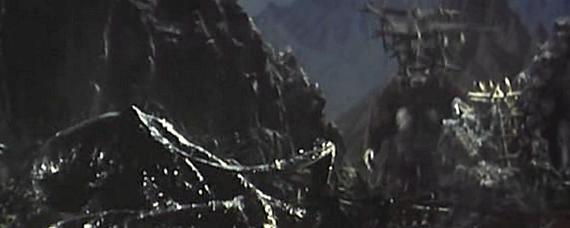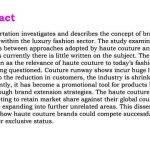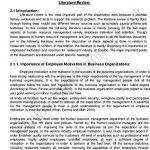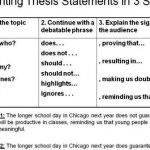MONSTER THEORY DISCUSSION GUIDE
For class, each of you should have read Monster Culture (Seven Theses) by Jeffrey Jerome Cohen. It is, by far, the most difficult piece we will read all semester, and many of you probably struggled quite a bit with his intense language and cultural references. To facilitate our discussion of Cohen’s explanation of what the concept of monster does in a culture, we’re going to break down each section and have one group accept responsibility for translating it for the rest of us. Your groups are listed below with each thesis:
Thesis I: The Monster’s Body Is a Cultural Body (Gerry, Rachel, Kelly)
- How does the image of the crossroads help introduce the idea of the monster as a cultural construct?
- Why does Cohen see the monster as a glyph (4)? Why does he suggest that the monster exits only to be read (4)?
- How can you apply this idea to any of the monsters we have read about (or watched) in class thus far?
Thesis II: The Monster Always Escapes (Sam, Cher, Irene)
- Cohen observes that No monster tastes of death but once but then links that apparently obvious statement to cultural anxiety and a propensity to shift (5). What kind of shift do monsters reborn make? How can this help us to understand the anxieties and issues in a culture?
- Why does the shifting image of the vampire support Cohen’s claim?
- How can you apply this idea to any of the monsters we have read about (or watched) in class thus far?
Thesis III: The Monster Is the Harbinger of Category Crisis (Christina, Geoff, Conor)
- What’s a Harbinger?
- What words are throwing off your ability to interpret this section of the essay? Share any of the definitions you looked up with your group and then seen if that helps to understand the essay a bit more.
- Why is the ability to categorize a person, place, or thing so important to people? How does this support a system or a cultural perspective?
- Why do monsters threaten our system? Does their existence merely make us uncomfortable, or is there a larger threat to the system?
- Identify a key quote in this section that you think is central to understanding the issues related to category crisis.
- How can you apply this idea to any of the monsters we have read about (or watched) in class thus far?
Thesis IV: The Monster Dwells at the Gates of Difference (Kelly, Erica, David)
- Cohen argues, the monster is an incorporation of the Outside, the Beyond–of all those loci that are rhetorically placed as distant and distinct but originate Within (7). What does he mean by the terms Outside and Beyond? How can these concepts be said to originate Within? Why the weird capitalization?
- What social catagories does monstrous difference tend to involve? What power does labeling a group monstrous give to the group using the label?
- How does scapegoating fit into this argument (11)?
- How does the monster’s difference offer an alternative? Why is this dangerous?
- Identify a key quote in this section that you think is central to understanding the issues related to category crisis.
- How can you apply this idea to any of the monsters we have read about (or watched) in class thus far?

Thesis V: The Monster Polices the Borders of the Possible (Vivian, Paul, Laura, Drew)
- How does the image of the monster police social norms?
- What examples does Cohen give of the monster of prohibition (13)? How do such monsters help support social hierarchies?
- How does Cohen use his discussion of incest and miscegenation (reproductive mixing of the races) to illustrate both the police-monster and the hierarchies it protects?
- Identify a key quote in this section that you think is central to understanding the issues related to category crisis.
- How can you apply this idea to any of the monsters we have read about (or watched) in class thus far?
Thesis VI: The Monster Is Really a Kind of Desire (Mike, Scott, Grecia)
- Cohen links monsters to the idea of the repressed, the attraction of forbidden practices (16), escapist fantasies and freedom (17). Why? What is the appeal of the monster?
- How do representations of monsters allow people to explore this appeal–and how is it normally reined in to restore social norms?
- What exactly is abjection (19)? How does it help readers to understand the attraction/repulsion split people feel towards monsters?
- Identify a key quote in this section that you think is central to understanding the issues related to category crisis.
- How can you apply this idea to any of the monsters we have read about (or watched) in class thus far?
Thesis VII: The Monster Stands at the Threshold
- How does this final thesis tie together all of the other theses?
- Isolate a quote as being the key point in this section.
Site URL: faculty.mc3.edu/hhalbert/fall2007/eng102
Site : Dr. Harold William Halbert
Site created September 15, 2007
Start with a question — then make the answer your thesis. Regardless of how complicated the subject is, almost any thesis can be constructed by answering a question. [2]
- Question: “What are the benefits of using computers in a fourth-grade classroom?”
- Thesis: “Computers allow fourth graders an early advantage in technological and scientific education.”
- Question: “Why is the Mississippi River so important in Mark Twain’s Huckleberry Finn? ?”
- Thesis: “The river comes to symbolize both division and progress, as it separates our characters and country while still providing the best chance for Huck and Jim to get to know one another.”
- Question: “Why do people seem to get angry at vegans, feminists, and other “morally righteous” subgroups?”
- Thesis: “Through careful sociological study, we’ve found that people naturally assume that “morally righteous” people look down on them as “inferior,” causing anger and conflict where there generally is none.”
Can you please put wikiHow on the whitelist for your ad blocker? wikiHow relies on ad money to give you our free how-to guides. Learn how .
Tailor your thesis to the type of paper you’re writing. Not all essays persuade, and not all essays teach. The goals of your paper will help you find the best thesis.
- Analytical: Breaks down something to better examine and understand it.
- Ex. “This dynamic between different generations sparks much of the play’s tension, as age becomes a motive for the violence and unrest that rocks King Lear.”
- Expository: Teaches or illuminates a point.
- Ex. “The explosion of 1800’s philosophies like Positivism, Marxism, and Darwinism undermined and refuted Christianity to instead focus on the real, tangible world.”
- Argumentative: Makes a claim, or backs up an opinion, to change other peoples’ minds.
- Ex. “Without the steady hand and specific decisions of Barack Obama, America would never have recovered from the hole it entered in the early 2000’s.” [3]
Take a specific stance to make your thesis more powerful. You should address a single issue in great detail so that your points can be fully supported in the body of the paper. [4] Consider the following examples:
- “While both sides fought the Civil War over the issue of slavery, the North fought for moral reasons while the South fought to preserve its own institutions.” [5]
- “The primary problem of the American steel industry is the lack of funds to renovate outdated plants and equipment.” [4]
- “Hemingway’s stories helped create a new prose style by employing extensive dialogue, shorter sentences, and strong Anglo-Saxon words.” [4]
Make the argument you’ve never seen before. The best theses find a novel, exciting way to approach the topic. They’re fresh and dynamic, which makes your essay fresh and dynamic.
- “After the third and fourth time you see him beat himself, one finally realizes that Huck Finn is literature’s first full-blown sadomasochist.”
- “The advent of internet technology has rendered copy write laws irrelevant — everyone can and should get writing, movies, art, and music for free.”
- “Though they have served admirably for the past two centuries, recent research shows that America needs to ditch the two-party system, and quickly.”
Ensure your thesis is provable. Do not come up with your thesis and then look it up later. The thesis is the end point of your research, not the beginning. You need to use a thesis you can actually back up with evidence.
- Good Theses Examples:
- “By owning up to the impossible contradictions, embracing them and questioning them, Blake forges his own faith, and is stronger for it. Ultimately, the only way for his poems to have faith is to temporarily lose it.”
- “According to its well-documented beliefs and philosophies, an existential society with no notion of either past or future cannot help but become stagnant.”
- “By reading “Ode to a Nightingale” through a modern deconstructionist lens, we can see how Keats viewed poetry as shifting and subjective, not some rigid form.”
- Bad Theses Examples:
- “The wrong people won the American Revolution.” While striking and unique, who is “right” and who is “wrong” is exceptionally hard to prove, and very subjective.
- “The theory of genetic inheritance is the binding theory of every human interaction.” Too complicated and overzealous. The scope of “every human interaction” is just too big
- “Paul Harding’s novel Tinkers is ultimately a cry for help from a clearly depressed author.” Unless you interviewed Harding extensively, or had a lot of real-life sources, you have no way of proving what is fact and what is fiction.”
Pick a topic that interests you. This must be the first step in writing your paper and your thesis statement because all direction of the paper will depend on what topic you are writing about. Unfortunately, you must ignore this step if the topic is decided for you.
Explore your topic. The goal of this step is to find a particular narrow subject in your topic which you can make an argument about. For example, take the topic of computers. There are many aspects of computers that can be expanded on such as hardware, software, and programming. However, vague topics like these do not make good theses. But something more narrow, such as the effects of Steve Jobs on the modern computer industry, allows for a much clearer focus.
Know the type, purpose, and audience of the paper. These are usually assigned by the instructor, but even if you get to choose them, you must understand that these will affect your thesis statement considerably. If you are writing a persuasive paper, your purpose will be to prove something to a specific group. If you are writing a descriptive paper, your purpose will be to describe something to a specific group. Each of these must be expressed in your thesis somehow.
Follow a rigid structure. Knowing the basic formulas will not only keep your thesis within the acceptable length but it will also help you see how your entire argument should be organized. Your thesis should contain two parts:
- A clear topic or subject matter
- A brief summary of what you will say
- Another way of looking at a thesis is as a formula, or a pattern, that comfortably holds your ideas. [8]
- [Something] [does something] because [reason(s)].
- Because [reason(s)], [something] [does something].
- Although [opposing evidence], [reasons] show [Something] [does something].
- The last example includes a counter-argument, which complicates the thesis but strengthens the argument. In fact, you should always be aware of all counter-arguments against your thesis. [9] Doing so will refine your thesis, and also force you to consider arguments you have to refute in your paper.
Write down your thesis. [9] Writing down a preliminary thesis will get you on the right track and force you to think about it, develop your ideas further, and clarify the content of the paper. You will be able to think about your thesis logically. clearly, and concisely.
- There are two schools of thought on thesis timing. Some people say you should not write the paper without a thesis in mind and written down, even if you have to alter it slightly by the end. The other school of thought says that you probably won’t know where you’re going until you get there, so don’t write the thesis until you know what it should be. Do whatever seems best to you.
Analyze your thesis statement once you think you have a final, or working, version. The point is to make sure you avoid making any mistakes that can weaken your thesis. To get a better idea of what to do and what to avoid, consider the following pointers:
- Never frame your thesis as a question. [9] The job of a thesis is to answer a question, not ask one.
- A thesis is not a list. [9] If you’re trying to answer a specific question, too many variables will send your paper off-focus. Keep it concise and brief.
- Never mention a new topic that you do not intend to discuss in the paper.
- Do not write in the first person. Using sentences such as, “I will show. ” is generally frowned upon by scholars.
- Do not be combative. The point of your paper is to convince someone of your position, not turn them off, and the best way to achieve that is to make them want to listen to you. Express an open-minded tone, finding common ground between different views.
Realize that your thesis does not have to be absolute. Consider it a “working thesis” that’s subject to change. As you write your paper you may find that your opinion changes or that your direction has veered slightly. So make sure to continuously re-read your thesis, comparing it to your paper and making the appropriate changes so the two match. Once your paper is finished, go back to your thesis and determine if it needs another revision.





 Writing thesis abstracts in education
Writing thesis abstracts in education Grid connected pv system phd thesis writing
Grid connected pv system phd thesis writing Thesis writing services in malaysia children
Thesis writing services in malaysia children Methods research thesis writing pdfs
Methods research thesis writing pdfs Basic steps to writing a thesis sentence
Basic steps to writing a thesis sentence






